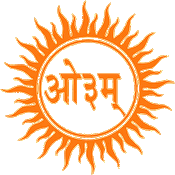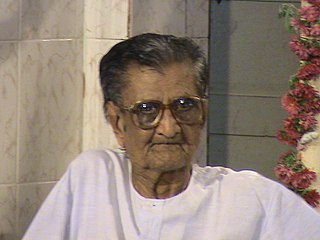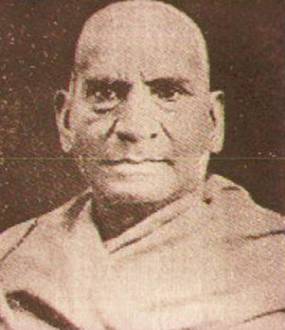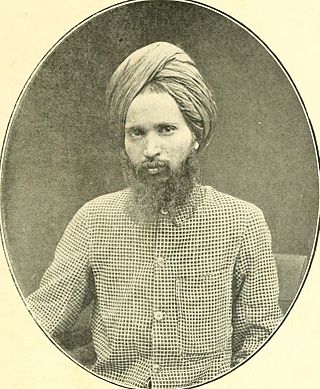Related Research Articles

Dayanand Saraswati, was an Indian philosopher, social leader and founder of the Arya Samaj, a reform movement of Hinduism. His magnum opus is the book Satyarth Prakash, which has remained a highly influential text on the philosophy of the Vedas and clarifications of various ideas and duties of human beings. He was the first to give the call for Swaraj as "India for Indians" in 1876, a call later taken up by Lokmanya Tilak. Denouncing the idolatry and ritualistic worship, he worked towards reviving Vedic ideologies. Subsequently, the philosopher and President of India, S. Radhakrishnan, called him one of the "makers of Modern India", as did Sri Aurobindo.

Arya Samaj is a monotheistic Indian Hindu reform movement that promotes values and practices based on the belief in the infallible authority of the Vedas. The samaj was founded by the sannyasi (ascetic) Dayanand Saraswati in the 1870s.
Contemporary groups, collectively termed Hindu reform movements, reform Hinduism, Neo-Hinduism, or Hindu revivalism, strive to introduce regeneration and reform to Hinduism, both in a religious or spiritual and in a societal sense. The movements started appearing during the Bengali Renaissance.

Swami Dayananda Saraswati was a renunciate monk of the Hindu Saraswati order of sannyasa. Pujya Swamiji as he was fondly known was a renowned traditional teacher of Advaita Vedanta, and founder of the Arsha Vidya Gurukulams in Pennsylvania, USA; Rishikesh, Uttarakhand and Coimbatore Tamil Nadu, India. He was also the spiritual Guru of Prime Minister Narendra Modi. He was awarded posthumously the Padma Bhushan,, for his exemplary service to the nation in the field of spiritualism in 2016.
Shuddhi is Sanskrit for purification. It is a term used to describe a Hindu religious movement aimed at the religious conversion of non-Hindus of Indian origin to Hinduism.

Pandit Sudhakar Chaturvedi was an Indian independence activist, Vedic scholar, Indologist, and claimed supercentenarian. At the claimed age of 122 years, 313 days, some Indian newspapers reported him as the oldest Indian ever.

The Arya Samaj was the first religious, cultural and educational Fiji Indian organisation established in Fiji. From its inception, in 1904, it attracted the young, educated and progressive Hindus into its fold. During the first three decades of the twentieth century, it was the sole voice of the Indian community in Fiji and as Fiji Indians won political rights, it was not surprising that first Indian members of the Legislative Council were all Arya Samajis. The influence of Arya Samaj over the Indians in Fiji gradually waned as other organisations representing Indians were established but it remained the dominant force in politics until 1959. The modern day Arya Samaj in Fiji still speaks out on issues affecting its members and its activities are visible through the numerous educational institutions that it manages.

Suriname has possibly the highest proportion of Hindus who are Arya Samajis, compared to any other country. In Suriname, the Hindu population had split, with roughly 20% following the teachings of Swami Dayanand Saraswati, founder of the Ārya Samāj, and 80% following the Sanatan Dharm. According to the census of 2012 the number of Ārya Samājĩs is 16,661. The arrival of Arya Samaj preachers in Suriname, in 1929, caused a rift in the Hindu community, between the followers of Sanātanī and the Ārya Samāj.

Arya Samaj is a Hindu reform movement in South Africa. Like other parts of the world where people of Indian origin are settled, the teachings of Swami Dayananda Saraswati, founder of the Arya Samaj, made their way to South Africa during the beginning of the twentieth century. The Arya Samaj encouraged Indian South Africans to take pride in their heritage and culture and promoted education and social reform.

Arya Samaj is a Hindu reform movement in Mauritius. Established in 1911, the Arya Paropkarini Sabha was officially registered in 1913. Since its creation Arya Samaj has had a great influence on the religious, social, educational and political lives of the people of Indian origin on the island. It has endeavoured to uphold the principles and ideals set forth by Maharishi Dayanand and his reformist movement. Some of the more notable ideals are women parity and free access to education. It has provided Hindus with a choice of progressive Hinduism, has promoted education with particular emphasis on Hindi and established orphanages, primary schools, colleges and tertiary institution.

The availability of Satyarth Prakash, inspired some people of Indian origin in Bangkok to follow the teachings of Swami Dayanand Saraswati and form the Vedic Dharam Pracharni Sabha on 5 May 1920. Weekly gatherings were held for the propagation of Vedic religion. Land was purchased and a Vedic mandir (temple) constructed. A library was also established. In 1922 the name of the Sabha (organisation) was changed to Arya Samaj and in 1923 it was affiliated with the Arya Pratinidhi Sabha of Uttar Pradesh in India. Although a small organisation, the Sabha has raised funds for relief fund for natural disasters in India. It also organises the celebration of Hindu festivals.

Satyarth Prakash is an 1875 book written originally in Hindi by Dayanand Saraswati, a religious and social reformer and the founder of Arya Samaj. The book was subsequently revised by Swami Dayanand Saraswati in 1882 and has been translated into more than 20 languages including Sanskrit and foreign languages, including English, French, German, Swahili, Arabic and Chinese. The major portion of the book is dedicated to laying down the reformist advocacy of Swami Dayanand with the last four chapters making a case for comparative study of different religious faiths.

Swami Shraddhanand, also known as Mahatma Munshi Ram Vij, was an Arya Samaj sannyasi and an Indian Independence activist who propagated the teachings of Dayananda Saraswati. This included the establishment of educational institutions, like the Gurukul Kangri University, and played a key role on the Sangathan and the Shuddhi (purification), a Hindu reform movement in the 1920s.
Sanātana Dharma is an alternative name for Hinduism used in Sanskrit and other Indian languages alongside the more common Hindu Dharma.

Lala Hansraj also known as Mahatama Hansraj, was an Indian educationist and a follower of Arya Samaj movement founder, Swami Dayanand. He founded, with Gurudatta Vidhyarthi, the Dayanand Anglo-Vedic Schools System (D.A.V.) in Lahore on 1 June 1886, where the first D.A.V. school was set up in memory of Dayanand who had died three years earlier.
Jainism and Hinduism are two ancient Indian religions. There are some similarities and differences between the two religions. Temples, gods, rituals, fasts and other religious components of Jainism are different from those of Hinduism.
Traitavad (त्रैतवाद) or Traita (त्रेत्) also known as Vedic Trinity, is a Hindu philosophy, in which Brahman (God), Jiva (soul) and Prakruti (matter/universe) are separate entities that exist eternally, unlike Advaita. It has similarities with Dvaita and Visishtadvaita, the major difference being that God is impersonal in Traitavad, unlike these two schools.
Below is a timeline of Adi Dharm or Adi Brahmo Samaj.
Swami Achhootanand, also known as Achutanand or Hariharanand, was an Indian anti-caste intellectual, Dalit writer, and social reformer. A former Arya Samajist, he became disillusioned with the Arya Samaj and established the Adi Hindu movement. He was a poet, critic, dramatist, and historian.
Sanātanī is a term used to describe Hindu duties that incorporate teachings from the Vedas, Upanishads, Puranas, and other Hindu religious texts and scriptures such as the Ramayana and its many versions, as well as the Mahabharata, which itself is often described as a concise guide to Hindu philosophy and a practical, self-contained guide to life. The word Sanātanī is coined from Sanātana Dharma which refers to the idea that its origins lie beyond human history, as revealed in the Hindu texts.
References
- ↑ Charu Gupta, Sexuality, Obscenity, Community: Women, Muslims, and the Hindu Public in Colonial India (2002), p. 334.
- ↑ Jones, Kenneth W. (1992-01-01). Religious Controversy in British India: Dialogues in South Asian Languages. SUNY Press. ISBN 978-0-7914-0827-8.